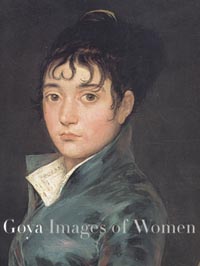
|
|
Goya
"Images of Women" Exhibit in A Review The first impression from seeing such a variety of Goya paintings gathered in one place is the enormity of many of these famous works. They fill whole walls and spill over into peripheral sight. Seeing (for example) The Grape Harvest in a book or catalog gives no projection of the largeness of it, the whole dominating physical size. A secondary impression following the impact of dimension is the finish on many of these "official" works of Spain's court painter. There is a high, refined gloss over these images, with a great deal of attention given to balancing the focal center (typically a group of figures) against the hazier, softer background (usually a soft-focused landscape). Between the sheer size and the scope of minute attention given to all the elements in the painting, one comes away with an idea of Goya's energy and professional determination to excel in his office. Goya's ambitions aside, that he could complete such large pieces with such attention to quality gives a telling contrast to the ideas in his smaller, private paintings, which show a cruder, more immediate style. And there is a very good selection of such works in the exhibit. There are a number of portraits, plus the loosely-themed personal works. The exhibit includes several rooms dedicated to etchings & drawings, with the selection of preliminary drawings for the etchings particularly interesting, since they do not show up in the usual Goya literature very often. The catalog published for the exhibit is very well done, and the image reproduction good. The text includes much detail for each painting, and the though laced with editorial comments on various contemporary issues (e.g., the condition of women in Spain) it should serve as a good window into the mindset for future generations about those who put together this exhibit collection. Also, the current arguments about authorship on some disputed paintings is given brief explanation, and much of the reasoning in fashion toward explaining Goya's personality is also mentioned, without any heavy-handed psychiatry, which is good. Seeing these paintings in the pseudo-mausoleum atmosphere of the National Gallery detracts a bit from the warmth in a good number of the images (and the tapestries, too, which in historical value help explain what exactly Goya was up to during the first half of his career), but on the whole the opportunity to see such a terrific collection of works in one place is quite an event, and the organizers must have had to do a great deal of work to mount it. Congratulations are due them for such a feat. -Erik Weems, November 2002 West
Building of the National
Gallery of Art |
BIO | ARTWORK | BOOKS | RESOURCES FOR STUDENTS | LINKS | CONTACT | NEWS | STATS | F.A.Q.
WEB
SITE COPYRIGHT©1997-2006 ERIK E. WEEMS
IMAGES ARE COPYRIGHT TO THEIR RESPECTIVE OWNERS
http://www.eeweems.com/goya/review_images_women.html
